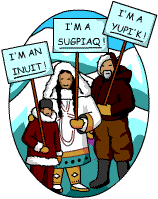Eskimo - the Wrong Term
Created | Updated Oct 11, 2006

'Eskimo' is a term commonly used to identify the indigenous tribes of Western and Northern Alaska and Northern Canada as well as Greenland. Originally of Asian extraction, these populations are thought to have crossed the Bering Land Bridge during a past period of glaciation (which would lower the water levels in the Bering Sea appropriately) and then to have followed the coastlines in their subsequent diaspora. The word itself has several putative origins, the most frequently related one being that it is a corruption of the French term for an eater of raw fish. These suggestions seem to have little basis in fact.
Without addressing the populations referred to by this moniker, a couple of points about the word itself are of importance.
It isn't very nice. While these populations tend to be very tolerant of outsiders, this word is no more the proper term than 'Kraut' would be for a German, or 'Limey' for an Englishman. Eskimo is an imposed word, and if you use it in conversation with a Yupi'k, Sugpiaq, or Inupiaq individual, they will most likely nod and smile while adding you to the stupid tourist list they have been assembling for eventual publication. If they smile and say 'thanks, gusuq!1', you have been rightfully insulted.
It isn't very accurate. The groups have their own names which they prefer to be known by. The populations near the Alaska peninsula are the Sugpiaq, those north to the region of Unalakleet are the Yupi'k, those north from Unalakleet clear across the Arctic to Greenland are various groups of the Inuit or Inupiaq peoples. These groups' languages are no more mutually intelligible than English and Italian.
It may get you in trouble. Despite similar appearances, people do not always appreciate confusing them with their ethnic cousins. Try calling a Kiwi, Aussie, or Scot an Englishman after a night of drinking and see what happens. In fact the indigenous inhabitants of inland Alaska and Canada are not related to the coastal peoples at all, and are much more closely kin to the Amerindian groups. They are also quite proud of this and if you wander around Fort Yukon asking to take pictures of the 'eskimo children' you had best be ready for a dip in the river, regardless of the season.
The tenet of this entry is the following: use an outdated term, and you will have to face the consequences.

